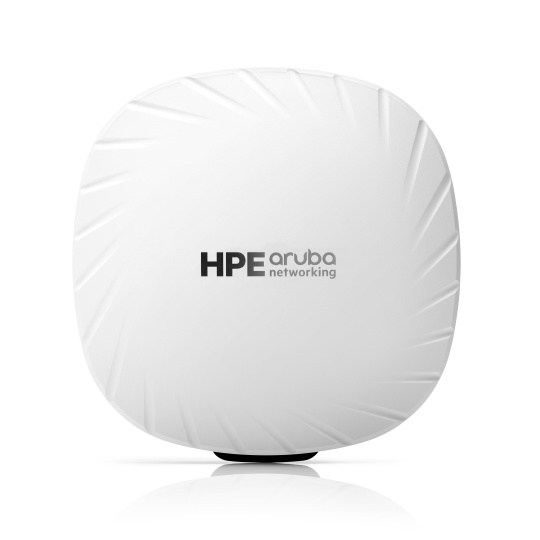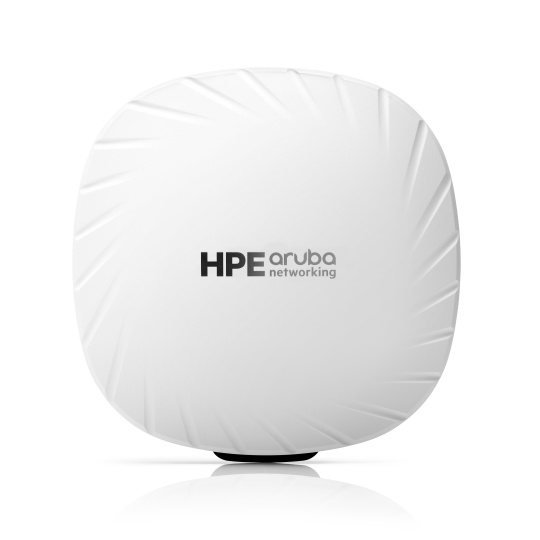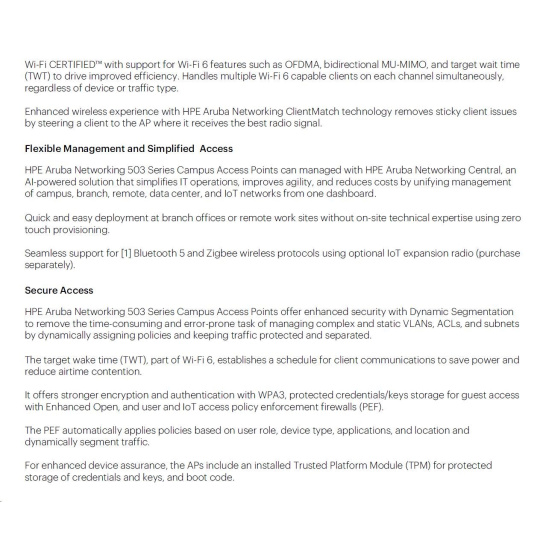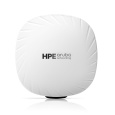HPE Aruba Networking AP-503-RW Dual Radio 2x2:2 802.11ax Wi-Fi 6 Campus Access Point (Includes Mount Bracket) R8M98A
HPE Aruba Networking AP-503-RW Dual Radio 2x2:2 802.11ax Wi-Fi 6 Campus Access Point (Includes Mount Bracket) R8M98A
HPE Aruba Networking AP-503-RW Dual Radio 2x2:2 802.11ax Wi-Fi 6 Campus Access Point (Includes Mount Bracket)
Affordable Wi-Fi 6 (802.11ax) for Low-to-Medium-Density Indoor Environments
The Aruba 503 Series Access Points (APs) provide cost-effective, high-performance connectivity for any organization experiencing device growth due to increased mobility, the shift to cloud, or IoT. With a maximum real-world aggregate data rate of 1.49 Gbps (HE80/HE20), the 503 Series deliver the speed and reliability needed for medium-density venues and workplaces such as schools, midsize offices, and retailers. Each 503 Series AP provides connectivity for a maximum of 256 associated clients per radio (512 in total).
Key Features
- 1.49 Gbps maximum real-world speed (HE80/HE20)
- WPA3 and Enhanced Open security
- Built-in technology that resolves sticky client issues
- OFDMA for enhanced multi-user efficiency
- IoT-ready Bluetooth 5 and Zigbee support (requires optional radio dongle)
- Offered as optional eco-friendly 10-packs
The 503 Series APs are designed to optimize user experience by maximizing Wi-Fi efficiency and dramatically reducing airtime contention between clients.
Features include orthogonal frequency-division multiple access (OFDMA) and cellular optimization. With up to 2 spatial streams (2SS) and 80MHz channel bandwidth (HE80), the 503 Series provides the next generation of wireless capabilities for cost-conscious deployments.
Read the Wi-Fi 6 Reference Guide for further information.
Advantages of OFDMA
This capability allows Aruba's APs to handle multiple Wi-Fi 6 capable clients on each channel simultaneously, regardless of device or traffic type. Channel utilization is optimized by handling each transaction via smaller sub-carriers or resource units (RUs), which means that multiple clients are sharing a channel and not competing for airtime and bandwidth.
Aruba Air SliceTM for application assurance
Aruba Air Slice delivers application assurance in order to optimize the user experience. By allocating radio resources such as time, frequency, and spatial stream to specific traffic types, Aruba APs can provide SLA-grade performance to client devices whether they support Wi-Fi 6 or prior standards.
Aruba Air Slice relies on Aruba's Policy Enforcement Firewall and Deep Packet Inspection (DPI) to identify user roles and applications so that bandwidth can be dynamically allocated to ensure performance. Air Slice is available for APs running controller-less mode (Instant) and with Aruba Central; controller-based APs will be supported in a future software release.
Wi-Fi 6 aware client optimization
Aruba's patented AI-powered ClientMatch technology eliminates sticky client issues by placing Wi-Fi 6 capable devices on the best available AP. Session metrics are used to steer mobile devices to the best AP based on available bandwidth, types of applications being used, and traffic type - even as users roam.
Resource management with AirMatch
To better support growth in client device density and in data volumes, AirMatch uses machine learning techniques that provide automated radio frequency optimization.
By analyzing the entire wireless network, AirMatch determines the optimum radio configuration and enables the network to automatically adapt in real time to changing RF conditions such as high noise and radar. It also adjusts for higher density, co-channel interference, and coverage gaps.
Aruba Advanced Cellular Coexistence (ACC)
Using built-in filtering, Aruba Advanced Cellular Coexistence automatically minimizes the impact of interference from cellular networks, distributed antenna systems (DAS), and commercial small cell or femtocell equipment.
| Optimized User Experience The 503 Series APs are designed to optimize user experience by maximizing Wi-Fi efficiency and dramatically reducing airtime contention between clients. Features include orthogonal frequency-division multiple access (OFDMA) and cellular optimization. With up to 2 spatial streams (2SS) and 80MHz channel bandwidth (HE80), the 503 Series provides the next generation of wireless capabilities for cost-conscious deployments. Read the Wi-Fi 6 Reference Guide for further information. Advantages of OFDMA This capability allows Aruba's APs to handle multiple Wi-Fi 6 capable clients on each channel simultaneously, regardless of device or traffic type. Channel utilization is optimized by handling each transaction via smaller sub-carriers or resource units (RUs), which means that multiple clients are sharing a channel and not competing for airtime and bandwidth. Aruba Air SliceTM for application assurance Aruba Air Slice delivers application assurance in order to optimize the user experience. By allocating radio resources such as time, frequency, and spatial stream to specific traffic types, Aruba APs can provide SLA-grade performance to client devices whether they support Wi-Fi 6 or prior standards. Aruba Air Slice relies on Aruba's Policy Enforcement Firewall and Deep Packet Inspection (DPI) to identify user roles and applications so that bandwidth can be dynamically allocated to ensure performance. Air Slice is available for APs running controller-less mode (Instant) and with Aruba Central; controller-based APs will be supported in a future software release. Wi-Fi 6 aware client optimization Aruba's patented AI-powered ClientMatch technology eliminates sticky client issues by placing Wi-Fi 6 capable devices on the best available AP. Session metrics are used to steer mobile devices to the best AP based on available bandwidth, types of applications being used, and traffic type - even as users roam. Resource management with AirMatch To better support growth in client device density and in data volumes, AirMatch uses machine learning techniques that provide automated radio frequency optimization. By analyzing the entire wireless network, AirMatch determines the optimum radio configuration and enables the network to automatically adapt in real time to changing RF conditions such as high noise and radar. It also adjusts for higher density, co-channel interference, and coverage gaps. Aruba Advanced Cellular Coexistence (ACC) Using built-in filtering, Aruba Advanced Cellular Coexistence automatically minimizes the impact of interference from cellular networks, distributed antenna systems (DAS), and commercial small cell or femtocell equipment. |
| IOT Platform Capabilities Using an optional IoT expansion radio, the 503 Series can use the Bluetooth 5 and 802.15.4/Zigbee radio to simplify deploying and managing IoT-based location services, asset tracking services, security solutions, and IoT sensors. This allows organizations to leverage the 503 Series as an IoT platform, which eliminates the need for an overlay infrastructure and additional IT resources. Target Wake Time (TWT) Ideal for IoT devices that communicate infrequently, TWT establishes a schedule for when clients need to communicate with an AP. This helps improve client power savings and reduces airtime contention with other clients. |
| Aruba Secure Infrastructure The Aruba 503 Series supports a Zero Trust/Secure Access Service Edge (SASE) architecture to better protect user authentication and wireless traffic. Select capabilities include:
| |||||||||||
| Flexible Operation and Management Our unified APs can operate as standalone access points or with a gateway for greater scalability, security, and manageability. APs can be deployed using zero touch provisioning - without on-site technical expertise - for ease of implementation in branch offices and for remote work. Aruba APs can be managed using cloud-based or on-premises solutions for any campus, branch, or remote work environment. As the management and orchestration console for Aruba ESP (Edge Services Platform), Aruba Central provides a single pane of glass for overseeing every aspect of wired and wireless LANs, WANs, and VPNs. AI-powered analytics, end-to-end orchestration and automation, and advanced security features are built natively into the solution. The 503 Series APs can also be deployed using HPE Greenlake for Aruba for flexible consumption and financing options.
|
| Mechanical Specifications
- 145mm (W) x 145mm (D) x 51mm (H) - 270g
- 145mm (W) x 145mm (D) x 35mm (H) - 255g
- 196mm (W) x 183mm (D) x 67mm (H) - 515g |
| Environmental Specifications
- Temperature: 0C to +40C / +32F to +104F - Relative humidity: 5% to 95% - ETS 300 019 class 3.2 environments - AP is plenum rated for use in air-handling spaces
- Temperature: -25C to +55C / +13F to +131F - Relative humidity: 10% to 100% - ETS 300 019 class 1.2 environments
- Temperature: -40C to +70C / -40F to +158F - Relative humidity: up to 95% - ETS 300 019 class 2.3 environments |
| Reliability Mean Time Between Failure (MTBF): 930khrs (106yrs) at +25C operating temperature. |
| Regulatory Compliance
For more country-specific regulatory information and approvals, please see your Aruba representative. |
| Regulatory Model Numbers
|
| Certifications
- Wi-Fi CERTIFIED a, b, g, n, ac - Wi-Fi CERTIFIED 6 - WPA, WPA2 and WPA3 - Enterprise with CNSA option, - Personal (SAE), Enhanced Open (OWE) - WMM, WMM-PS, Wi-Fi Agile Multiband - Passpoint (release 2)
|






